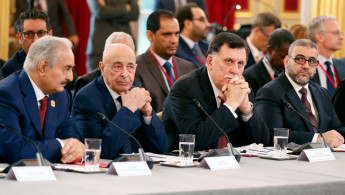Libya rivals agree to hold elections during UAE meeting: UN
The head of Libya's internationally recognised government and a military strongman who backs a rival administration in the country's east have met and agreed to hold elections, the United Nations said on Thursday.
Unity government leader Fayez al-Sarraj met Khalifa Haftar on Wednesday in Abu Dhabi, where they agreed "on the need to end the transitional phase through general elections and on ways to preserve the stability of #Libya and unify its institutions," the UN's Libya mission UNSMIL tweeted.
Libya has been torn between rival administrations and a myriad of militias since the NATO-backed overthrow and killing of dictator Muammar Qaddafi in 2011.
Chief among them are an internationally recognised Government of National Accord led by Fayez al-Sarraj in Tripoli and a parallel administration in the east loyal to strongman Khalifa Haftar.
The political chaos and insecurity benefits jihadist groups, which have carried out numerous attacks in recent years, including more than 20 in 2018 against institutions linked to the GNA and Haftar's self-styled Libyan National Army.
The leaders had agreed to a Paris-brokered deal in May 2018 to hold a nationwide election by the end of the year.
But instability, territorial disputes and divisions in the oil-rich country delayed those plans.
Talks in Italy in November laid bare deep divisions between the key power brokers, with some delegates refusing to sit side by side and Haftar snubbing the main conference to organise separate talks with international leaders.
United Nations envoy Ghassan Salame told the UN Security Council last month that he was planning to organise a national conference inside Libya within weeks to pave the way for elections.
But analysts have warned that the UN's efforts could be threatened after Haftar's forces launched an offensive into the south in mid-January, aimed at rooting out "terrorists" and foreign fighters.
The LNA already controls vital oil installations in Libya's east.
Powerful Tripoli-based militias have condemned Haftar's operation as a power grab, although the GNA itself has not been as explicit in its opposition.
Agencies contributed to this report.
Follow us on Twitter: @The_NewArab





 Follow the Middle East's top stories in English at The New Arab on Google News
Follow the Middle East's top stories in English at The New Arab on Google News

![Israeli forces ordered bombed Gaza's Jabalia, ordering residents to leave [Getty]](/sites/default/files/styles/image_330x185/public/2176418030.jpeg?h=a5f2f23a&itok=_YGZaP1z)
